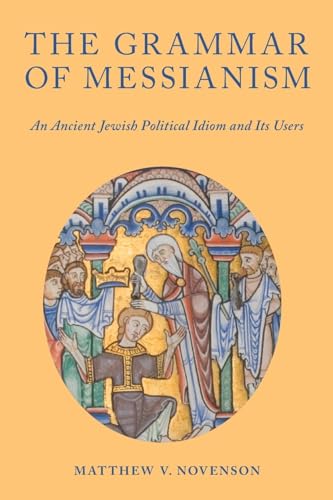The Grammar of Messianism: An Ancient Jewish Political Idiom and Its Users


артикул: COM9780190053215USED
СОГЛАСНО НАШИМ ДАННЫМ, ЭТОТ ПРОДУКТ СЕЙЧАС НЕ ДОСТУПЕН
$35.00
Доставка из: Канада
Описание
Messianism is one of the great themes in intellectual history. But because it has done so much important ideological work for the people who have written about it, the historical roots of the discourse have been obscured from view. What did it mean to talk about "messiahs" in the ancient world, before the idea of messianism became a philosophical juggernaut, dictating the terms for all subsequent discussion of the topic? In this book, Matthew V. Novenson offers a revisionist account of messianism in antiquity. He shows that, for the ancient Jews and Christians who used the term, a messiah was not an article of faith but a manner of speaking. It was a scriptural figure of speech, one among numerous others, useful for thinking about kinds of political order: present or future, real or ideal, monarchic or theocratic, dynastic or charismatic, and other variations besides. The early Christians famously seized upon the title "messiah" (in Greek, "Christ") for their founding hero and molded the sense of the term in certain ways; but, Novenson shows, this is just what all ancient messiah texts do, each in its own way. If we hope to understand the ancient texts about messiahs (from Deutero-Isaiah to the Parables of Enoch, from the Qumran Community Rule to the Gospel of John, from the Pseudo-Clementines to Sefer Zerubbabel), we must learn to think not in terms of a world-historical idea but of a language game, of so many creative reuses of an archaic Israelite idiom. In The Grammar of Messianism, Novenson demonstrates the possibility and the benefit of thinking of messianism in this way.
График изменения цены & курс обмена валют
Пользователи также просматривали

$1,389.18
SK-LKD09A SAIKANG Medical Surgical Operation Room Ceiling Luminescence Shadowless Mobile Operating LED Lamp
aliexpress.com
$45.53
Small stool, household backrest, net red round low stool, children's sofa stool, baby chair, creative and fashionable shoe
aliexpress.com
$62.50
Creative colorful pot animal pose cute dog living room counter bedroom swing craft hand
aliexpress.com
$21.42
E27 Rattan Woven Lamp Shade Vintage Table Light Chandelier Light Shade Frame Fixture Basket for Home Living Room Bedroom
aliexpress.com
$21.25
Комплект контроллера EDP для телефона 2K, фотосессия 2560x1600, micro USB Mini 2, совместимый с HDMI экран
aliexpress.ru
$44.62
Folding Car Trunk Organizer Storage Box Carbon Fiber Multipurpose Collapsible Car Trunk Storage Auto Bags for SUV, Truck, Sedan
aliexpress.com
$13.52
Низкопрофильный дренаж для душа с перфорированным ситечком, боковой дренаж для душа, боковой дренаж в сборе, белый
aliexpress.com
$38.00
VEVORbrand 4 бар полотенцесушитель с подогревом Электрический нагреватель полотенец с таймером настенный подключаемый нагреватель полотенец полированный
aliexpress.ru
$1.35
Новинка, противоскользящая крышка переключения передач автомобиля, из ледяного шелка, Аксессуары для автомобилей, защита от царапин в сало...
aliexpress.ru
$77.22
new arrive designer women h egerie slipper luxury lady egerie flat sandals qssr summer beach flip casual shoes perfect gift
dhgate.com
$21.95
Shark Children s Sandals Slippers Summer Thick Bottom 2nd Generation Shark EVA Slippers Child Non-Slip Soft Bottom Baby Sandals
walmart.com
$149.00
Eittar Electronic throttle controller accelerator for LEXUS IS250 LEXUS IS350 2005.9~2013.4
aliexpress.com
$5.78
6pcs Wall Mounted Bedroom Heavy Duty Remote Control Holder Desktop Socket Fixing Durable Multifunctional Home Office Magnetic On
aliexpress.com
$11.27
cat toys lounge handmade cats kitten scratcher scratching post interactive corrugated paper toy for pet training
dhgate.com








